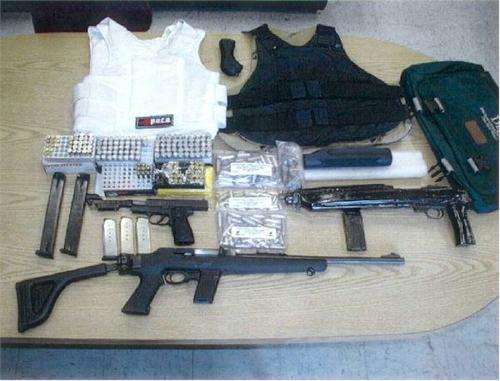Law enforcement247 on U.S. terror watch list bought guns, explosives in 2010
There are eleven reasons why an individual may not be able to buy firearms or explosives in the United States — for example, being a convicted felon or an illegal immigrant; those on the U.S. terror watch list, however, are free to buy firearms and explosives; according to the FBI, in 2010 247 of them did — a similar number to that of 2009; some lawmakers want the attorney general to be able to prevent an individual on the watch list to buy a gun, but the counterargument is that the list is not always accurate, and that the attorney general is a political appointee; moreover, the list is secret, and letting people know they are on it may complicate the ability of law enforcement to track them and their associates

Seized weapons, explosive and body armor // Source: stolarskaradnja.com
The FBI told the Government Accountability Office (GAO) that in 2010, 247 people who were on the U.S. terror watch list bought guns. The number is similar to the number of terror suspects who bought guns in 2009.
AP reports that between February 2004 and December 2010, 1,453 individuals who were on the terror watch list tried to buy firearms or explosives, and that 90 percent of them did so.
AP notes that there are eleven reasons why an individual cannot buy a gun in the United States – for example, being an illegal immigrant or a convicted felon – but being on the U.S. terror watch list is not one of these reasons.
Being on the terror watch list means only that the U.S. government suspects the individual of being a terrorist or of having connections with a terrorist organization. This is not the equivalent of a court convicting an individual of a felony.
Senator Frank Lautenberg (D-new Jersey) leads a group of lawmakers who want to give the attorney general the authority to prevent an individual who is on the terror watch list from buying guns or explosives. The National Rifle Association (NRA) opposes the proposal, saying that the list is not always accurate, a fact that may lead to an individual who is on the list by mistake to be denied his or constitutional right.
The NRA also notes that the attorney general is a political appointee, and that it should not be the decision of such an appointee to determine which individual on the list is more dangerous than others.
What complicates matters is the fact that the list is secret, and individuals who are on it do not even know this fact. AP notes that a blanket denial to buy firearms to those on the list would alert them to the fact that they are on the list. This may lead them to change their – perhaps even change their identity – complicating the work of law enforcement and intelligence services who track these people and to learn more about their activities and associates.
